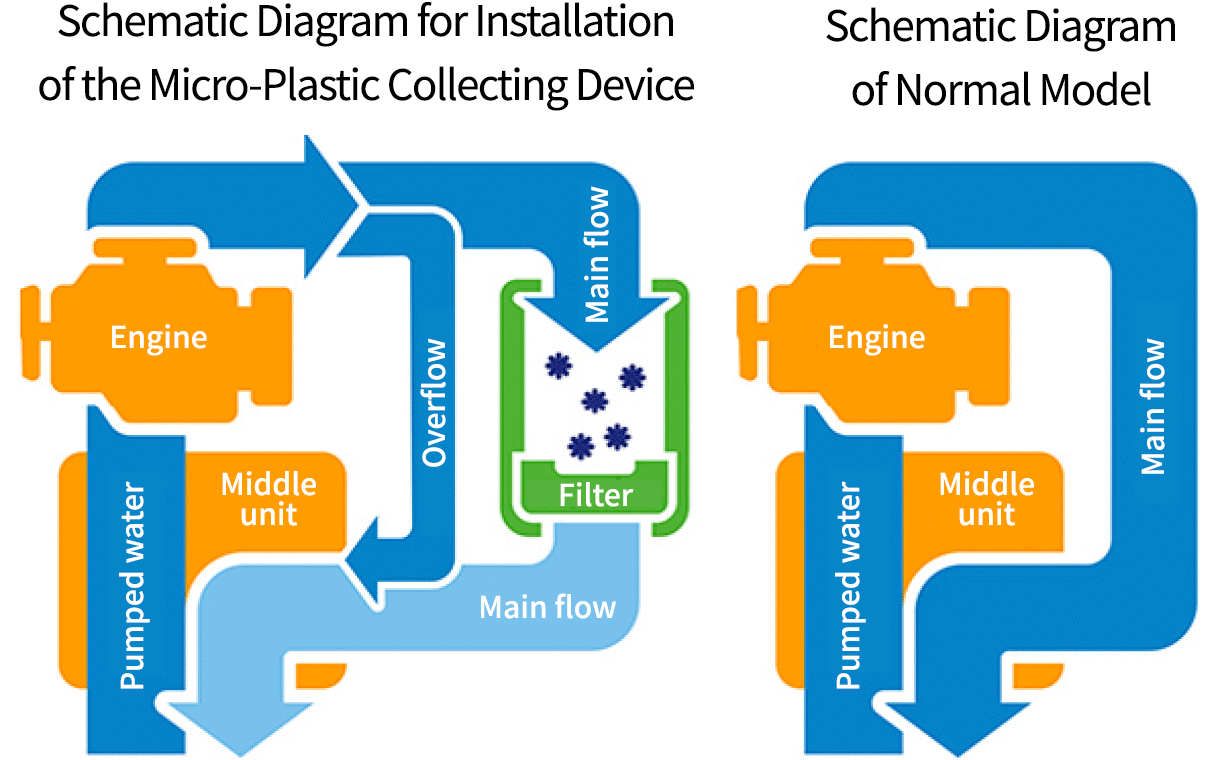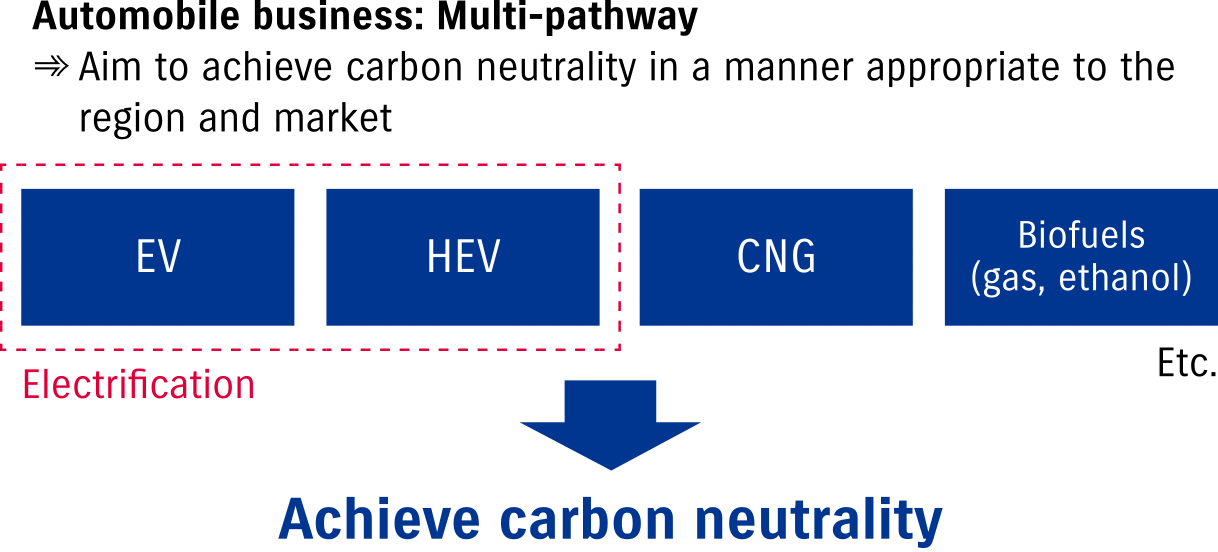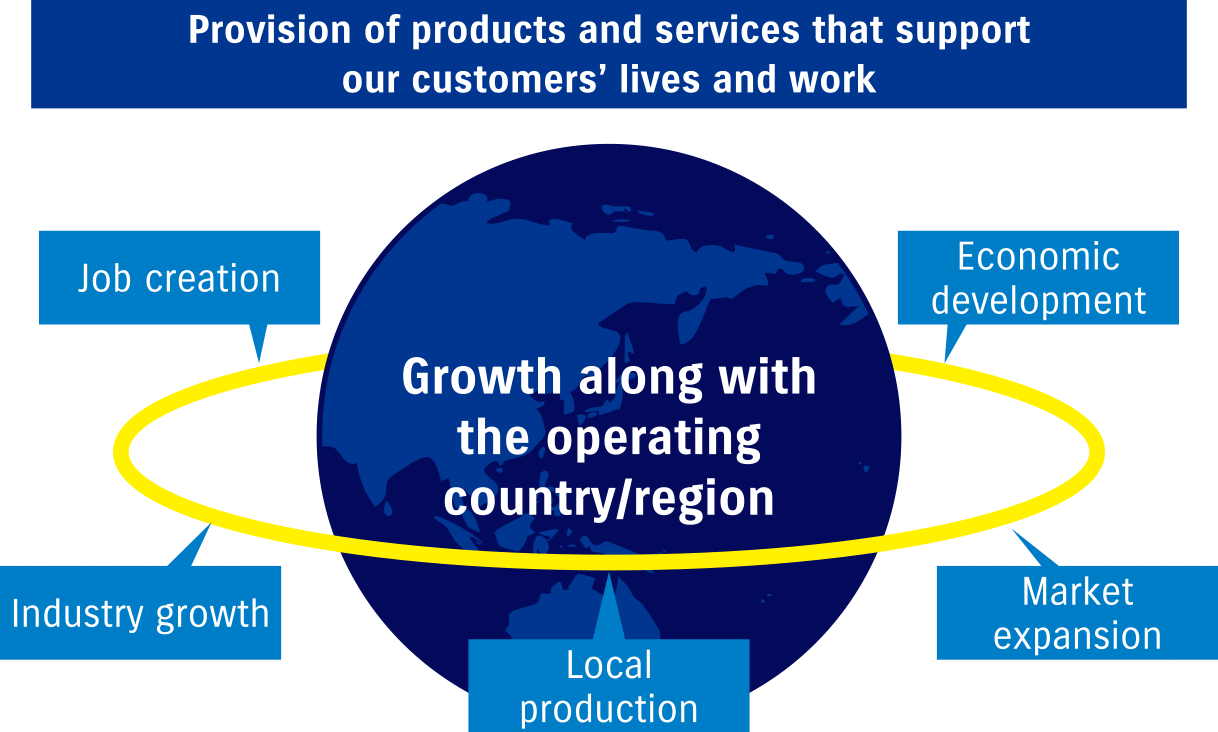- Sustainability
- Suzuki Sustainability
-
Basic Policy and Promotion Structure
- Message from the President
- Corporate Philosophy
- Corporate Policy
- Basic Policy and Promotion Structure
- Materiality
- Policy for Stakeholders
- External Assessment of Sustainability
Basic Policy and Promotion Structure
Basic Policy Regarding Sustainability
Suzuki has up to now contributed to the social and economic development of many countries through the development and popularization of various types of products, including the environmentally friendly, compact automobiles that are our specialty.
Origin

Suzuki Loom Works at the time of its founding in 1909
In 1908, founder Michio Suzuki made a loom by hand in order to make his mother’s work easier, which led to the founding of Suzuki Loom Works. A desire to solve the problems of its customers is where Suzuki started. It began as a loom business and expanded into multiple businesses.
Mobility business

Power Free
In 1952, the history of Suzuki motorcycles began with the launch of the Power Free motorized bicycle, which delighted customers by enabling them to travel longer distances with ease.
Three years later, we entered the automobile business with the launch of Japan's first mass-produced mini vehicle, the Suzulight. After that, the launching of outboard motors and electric wheelchairs led us to our current business.
Global development

Start of Suzuki four-wheel vehicle production at Maruti Suzuki India Limited
Suzuki, which has characteristically handled both motorcycles and automobiles for a long time, leveraged the convenience and economical performance offered by motorcycles to quickly seize opportunities for motorization around the world. We have increased our contact points with customers this way, traveling a path of popularization and expansion from motorcycles to automobiles while growing together with the economies of countries and regions.
A particularly significant turning point in our global development came in 1979 with the birth of the Alto. The Alto, which was sold at a low price that defied convention, was a big hit, and helped to launch the market for mini vehicles in Japan. Moreover, we were able to establish a joint venture company because we were chosen as a partner for India’s national car development initiative. Subsequently, Suzuki’s reputation in India spread to Hungary, resulting in the expansion of plants into Europe.
For people’s prosperous life

Maruti Suzuki Gujarat Plant
In order to “grow together with the countries and regions in which we operate," we have contributed to economic development by promoting local production overseas and providing products and services that meet local needs.
In India, we launched the operation of our automobile manufacturing plant in 1983, and are currently expanding the plant’s annual production capacity to 2.35 million units. Our history of factory expansion is also the history of our relationship with business partners, and we move forward on the same path while growing together, building a strong procurement network with a high local procurement ratio exceeding 90%. Furthermore, we have worked to expand our sales and service networks, and the network, which extends to rural areas, is our greatest strength. In recent years, we have been accelerating local R&D and actively recruiting talented engineers. In this way, we are contributing to India’s economic growth while creating many local jobs through production, procurement, sales and development in the automobile industry that affects many areas. At the end of March 2023, we had passed 30 million cumulative domestic sales in India. We plan to increase production capacity to four million vehicles at an appropriate time while monitoring market conditions.
Supporting communities by staying close to people’s lives

A mini-truck market (Hamamatsu City, Shizuoka Prefecture)
Products we make based on “Sho-Sho-Kei-Tan-Bi (Smaller, Fewer, Lighter, Shorter, Beauty),” the root of Suzuki’s manufacturing, are compact while being user-friendly, high performance and offered at affordable prices. By providing many people with freedom of movement, we support lifestyles in regions all over the world.
In Japan, mini vehicles that are easy to use and economical have become an indispensable part of life as a means to get around, particularly in rural areas where public transport is not easily accessible. Furthermore, “mini-truck markets" are held every year in local cities across Japan as a place to display food products, local specialties and sundries on mini truck beds, as well as to gather together and sell them in shopping districts. These events attract a large number of customers at a low cost, and contribute to the revitalization of local economies.
Moreover, in emerging countries, Suzuki’s specialty of providing affordable, high performance compact cars matches the needs of first time car buyer customers, enabling many of them to enjoy a comfortable, affluent lifestyle with an automobile.
Solutions unique to Suzuki
A feature of the world’s first Micro-Plastic Collecting Device for outboard motors, in which mass-production started in July 2022, is that it has an extremely simple structure that also keeps down component costs, rather than being a complicated and expensive device. It was an idea for a device that anyone could have come up with, and yet nobody had actually attempted, which started from a chat during waterside cleanup activities. Embracing the spirit of trying things out, we took on the challenge, refined things through trial and error, and quickly brought the device to market. Our goal was to make it available to as many people as possible, keeping the performance of an outboard motor intact while making it as simple and affordable to produce as we could. With Suzuki’s unique ingenuity and passion, grounded in the principles of “Sho-Sho-Kei-Tan-Bi (Smaller, Fewer, Lighter, Shorter, Beauty),” we created a product that customers can enjoy while helping us to address social challenges at the same time.

Continuing to be an indispensable presence
Of the various issues confronting the automobile industry, we are making efforts in electrification toward achieving the carbon neutrality that is viewed as being of particular importance. Achieving carbon neutrality requires the reduction of overall CO2 emissions. We must consider not only emissions from driving but also those generated during vehicle production and fuel refining, including for electricity generation.
Based on this way of thinking, in order to comprehensively reduce CO2 emissions, we believe it is important to promote a multi-pathway approach of offering hybrid, CNG, and biofuel vehicles in addition to EVs, as well as hydrogen-powered mobility, in combinations that are suited to each region and market.

In compact cars, an area in which Suzuki excels, we have gained great support from many people because of their affordability, but making them into EV would raise the price, thus reducing the benefits of these compact cars. To continue to be an irreplaceable presence in people’s lives, by leveraging the philosophy behind “Sho-Sho-Kei-Tan-Bi (Smaller, Fewer, Lighter, Shorter, Beauty)” and finding the right balance between cost and driving range and equipment, we respond to customer needs and usage styles and are planning to develop the right EVs for the right place to launch onto the market.
Moreover, our unique initiative to tackle this challenge is the carbon neutral biogas business, which develops mass-production and supply systems for biogas which is derived from cow dung, dairy wastes that can be seen mainly in India’s rural area. This biogas fuel can be used in Suzuki’s CNG vehicles, which account for a share of approximately 70% of India’s CNG vehicle market, and if we are able to make this materialize, it will enable us to continue providing automobiles at affordable prices. This technology can be developed not just for India, but for emerging countries in Africa and ASEAN, as well as for dairy farming areas in Japan.
We will continue to develop our mobility business, centered on automobiles and including motorcycles, outboard motors and motorized wheelchairs, and by providing products and services that support customers’ lives, aim to be a company that continues to be needed by people and society by both solving social issues and achieving corporate growth.

Banas Dairy biogas purification plant
(Banas Dairy and Suzuki are jointly constructing more plants based on this plant)

Promotion Structure
Sustainability Promotion Structure
(As of June 2025)

Main sustainability-related agenda items for the Board of Directors (FY2024)
- Carbon-neutral initiatives (EV- and biogas-related)
- Personnel strategy
- Addressing human rights in the supply chain
- Intellectual property governance, etc.
- Information security
- Initiatives to resolve social issues (NBV activities), etc.
At executive and business operations committees and meetings and Corporate Governance Committee meetings attended by Representative Directors and related officers, issues, policies and measures concerning sustainability (environmental, social, governance) are discussed. Issues of particular importance are brought up and reported to the Board of Directors. Along with the management, the Company as a whole aims to promote viable sustainable activities.
The dedicated department established within the Corporate Planning Department to promote sustainability takes the lead in cooperation among internal departments and Group companies in promoting cross-organizational initiatives to solve social issues.

 Japan
Japan
